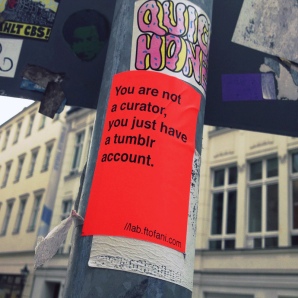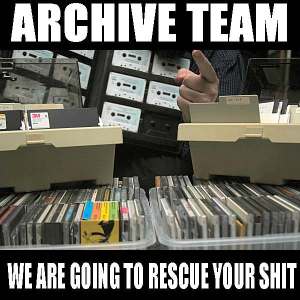One of the hottest topics these days for museums, libraries, and archives is digital technology. What are the benefits of new technologies for us and the publics we aim to serve? What are the challenges that arise from trying to use these new forms of technology? There are so many facets to this topic, that it is hard to reduce a discussion about it to the size of a reasonable blog post. In past posts on this blog, I have talked a bit about how scholars and museum and library professionals have been facing some of these issues. But this week, after reading Erika Dicker’s, “The Impact of Blogs and Other Social Media on the Life of a Curator,” I would like to take some time here to discuss how the role of the curator has changed with this onslaught of new technologies and methodologies.
Traditionally, the curator is a subject specialist who is responsible for an institution’s collections and involved with the interpretation of that institution’s material. As a Curatorial Assistant in the Rare Book and Special Collections Division of the Library of Congress, a large part of my job was to organize, research, and give presentations about items from various collections for visitors, scholars, and colleagues. What they saw and heard in these presentations was based on my interests, my research, and my selection of which specific items to present. The rest of the collection was invisible to them.
While curators continue to do this kind of work, new technologies are changing the way institutions function, and so must the work of the curator change to match the goals of the institutions they work for. With the onslaught of interest in digitization, online exhibits and institutional blogs, curators must now embrace a new skillset and add it to their already large toolkit.
How has digital technology, including social media, changed how we see the role of the curator?
The public is more aware than ever of their own power in communicating, collecting, and curating the information that is of interest to them. Thanks to sites such as Flikr, Pinterest, and Flipboard (for more content curation sites check this out) people everywhere are now becomming their own curators. As far as the professionals are concerned, their jobs have taken on a new dimension; one which can be shared with the publics they aim to serve, thus allowing for more collaboration in a realm that was once thought to be reserved for the specialist. Professional curators can now seek out the help of their communities both before and after they produce some product for the public, and can perhaps provide material that is more suited to what people want to hear about. Indeed, through digital technology, the information curators are sharing is now accessible to more people than ever through the internet. This shared authority can be both inspiring and anciety-inducing to the professional curator.
What are your thoughts on shared authority for curating exhibits and providing interesting information for the public? Where (if anywhere) should we draw the line? Does having a Flikr or Pinterest account make you a curator in a sense?


